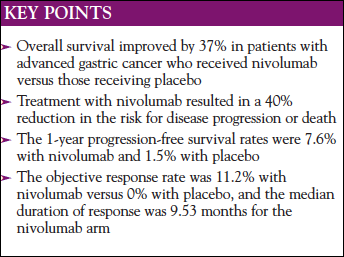Nivolumab as salvage treatment significantly reduced the risk for death after second-line or later chemotherapy in patients with advanced gastric or gastroesophageal junction cancer. In a double-blind, randomized phase 3 trial, the median overall survival was improved by 37% in patients assigned to nivolumab versus placebo after previous treatment with at least 2 regimens, reported Yoon-Koo Kang, MD, PhD, Department of Oncology, Asan Medical Center, Seoul, South Korea, at the 2017 Gastrointestinal Cancers Symposium.
Our data indicate “that nivolumab could be a new treatment option for patients with heavily pretreated advanced gastric cancer and also provide a strong rationale to explore nivolumab in earlier lines of treatment for gastric cancer,” said Dr Kang.
Currently, there are no established treatments for patients with advanced gastric cancer whose disease is progressing after ≥2 previous chemotherapy regimens, indicating a need for novel treatment regimens in this patient population.
Advanced gastric cancers “are characterized by high mutational burden and amplification of immune checkpoint inhibitory proteins, such as programmed death-1 ligand, suggesting that they may be responsive to immunotherapies that target programmed death-1,” Dr Kang said.
Increased Response Rate and Longer Survival
This clinical trial was conducted in Japan, Korea, and Taiwan, and evaluated nivolumab in 493 patients with unresectable, previously treated advanced gastric or gastroesophageal junction cancer who were refractory to or intolerant of standard therapy. The patients were randomized in a 2:1 ratio to nivolumab 3 mg/kg or to placebo every 2 weeks until disease progression or discontinuation of therapy because of unacceptable toxicity.
Median overall survival, the primary end point, was 5.32 months in patients receiving nivolumab compared with 4.14 months in patients receiving placebo (hazard ratio [HR], 0.63; P <.0001). The 12-month overall survival rate was 26.6% in the nivolumab arm compared with 10.9% in the placebo group.
The objective response rates were 11.2% in the nivolumab arm versus 0% in the placebo arm; all responses were partial, and the median duration of response was 9.53 months for the nivolumab arm.
The median progression-free survival (PFS) in the nivolumab arm was 1.61 months versus 1.45 months in the placebo arm, corresponding to a 40% reduction in the risks for progression or death (HR, 0.60; P <.0001). The 12-month PFS rates were 7.6% among nivolumab recipients and 1.5% with placebo.
The safety profile of nivolumab was consistent with previously reported studies in solid tumors and was comparable with that of the placebo arm. Treatment-related adverse events of any grade occurred in 42.7% of patients receiving nivolumab and in 26.7% of the group receiving placebo. Grade 3/4 adverse events were reported by 10.3% and 4.3% of the cohorts receiving nivolumab and placebo, respectively.

Earlier Treatment with Nivolumab Needed
Nivolumab is a new treatment option in patients with advanced gastric cancers, agreed Heinz-Josef Lenz, MD, FACP, Section Head, Gastrointestinal Oncology, University of Southern California Norris Comprehensive Cancer Center, Los Angeles, who commented on the study.
“It should not get stuck in third line. We need to move from the third to the second, and, when we have the right patient selection, potentially to the first line,” Dr Lenz said.
Identifying the patients who have the best chance of responding to nivolumab is critical, Dr Lenz said, noting that the study was conducted in 3 Asian countries. “Does that matter? Maybe it does,” he said, based on data from The Cancer Genome Atlas (TCGA).
“There are interesting data published in Nature Medicine last year showing that the composition and the molecular makeup of gastric cancer patients in Asia or Singapore or in the TCGA are different. That may impact the efficacy of immunotherapies,” Dr Lenz observed.



